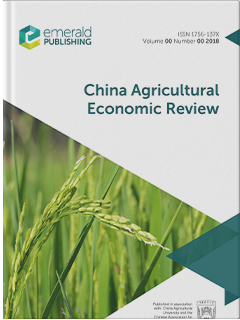量化俄乌危机对粮食安全和贸易格局的影响:来自结构性一般均衡贸易模型的证据
IF 4.6
2区 经济学
Q1 AGRICULTURAL ECONOMICS & POLICY
引用次数: 10
摘要
考虑到俄罗斯和乌克兰在农业方面的重要性,作者量化了俄乌冲突对世界粮食产量、贸易、价格和粮食安全的潜在影响。设计/方法/方法作者主要运用定量和结构性的多国和多部门一般均衡贸易模型来分析冲突对全球粮食贸易格局和安全的潜在影响。研究结果首先,作者发现,冲突将导致农产品价格飙升、贸易量减少和严重的粮食不安全,尤其是对那些严重依赖从乌克兰和俄罗斯进口粮食的国家,如埃及和土耳其。其次,美国和加拿大等主要生产国甚至可能从冲突中受益。第三,对上游能源和化肥的限制将放大粮食不安全的负面影响。本研究基于部门联系和定量一般均衡贸易框架,分析了俄乌冲突对全球粮食安全的影响。与传统的全球贸易分析项目(GTAP)模型相比,作者基于更少的参数更清晰地展示了内在机制的影响,展示了冲突对跨部门和国家的粮食产出、贸易、价格和福利的综合影响。本文章由计算机程序翻译,如有差异,请以英文原文为准。
Quantifying the impact of Russia–Ukraine crisis on food security and trade pattern: evidence from a structural general equilibrium trade model
PurposeConsidering the importance of Russia and Ukraine in agriculture, the authors quantify the potential impact of the Russia–Ukraine conflict on food output, trade, prices and food security for the world.Design/methodology/approachThe authors mainly use the quantitative and structural multi-country and multi-sector general equilibrium trade model to analyze the potential impacts of the conflict on the global food trade pattern and security.FindingsFirst, the authors found that the conflict would lead to soaring agricultural prices, decreasing trade volume and severe food insecurity especially for countries that rely heavily on grain imports from Ukraine and Russia, such as Egypt and Turkey. Second, major production countries such as the United States and Canada may even benefit from the conflict. Third, restrictions on upstream energy and fertilizer will amplify the negative effects of food insecurity.Originality/valueThis study analyzed the effect of Russia–Ukraine conflict on global food security based on sector linkages and the quantitative general equilibrium trade framework. With a clearer demonstration of the influence about the inherent mechanism based on fewer parameters compared with traditional Global Trade Analysis Project (GTAP) models, the authors showed integrated impacts of the conflict on food output, trade, prices and welfare across sectors and countries.
求助全文
通过发布文献求助,成功后即可免费获取论文全文。
去求助
来源期刊

China Agricultural Economic Review
AGRICULTURAL ECONOMICS & POLICY-
CiteScore
9.80
自引率
5.90%
发文量
41
审稿时长
>12 weeks
期刊介绍:
Published in association with China Agricultural University and the Chinese Association for Agricultural Economics, China Agricultural Economic Review publishes academic writings by international scholars, and particularly encourages empirical work that can be replicated and extended by others; and research articles that employ econometric and statistical hypothesis testing, optimization and simulation models. The journal aims to publish research which can be applied to China’s agricultural and rural policy-making process, the development of the agricultural economics discipline and to developing countries hoping to learn from China’s agricultural and rural development.
 求助内容:
求助内容: 应助结果提醒方式:
应助结果提醒方式:


